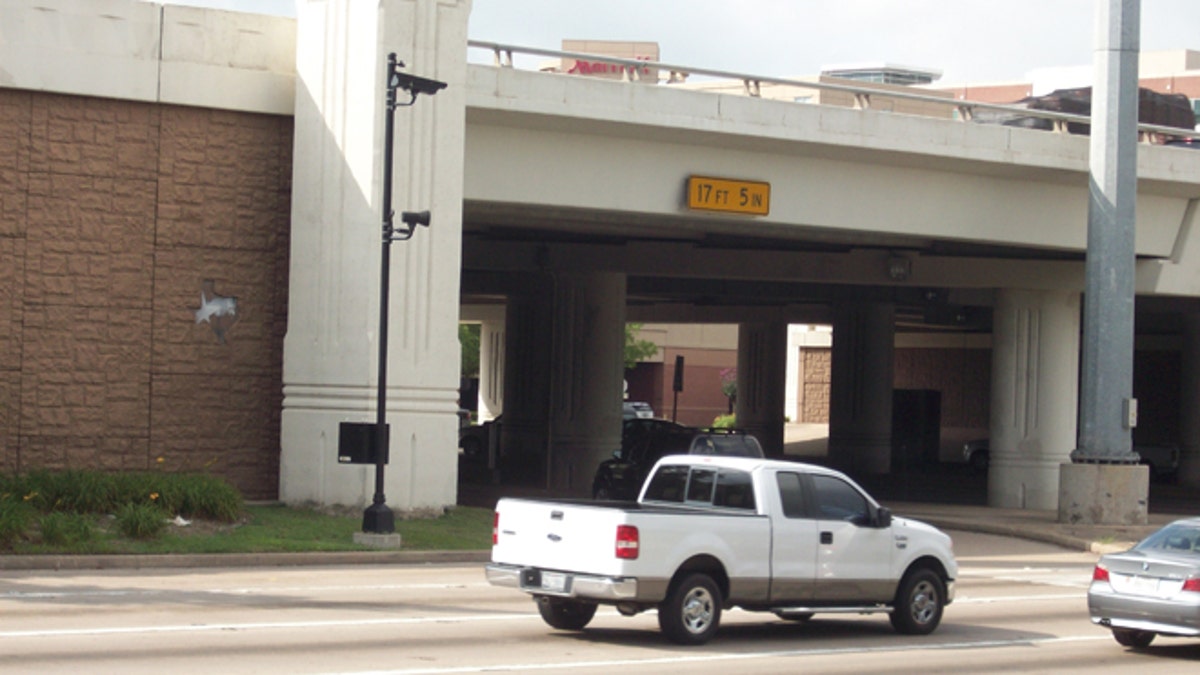
June 12, 2013: Helwig Van Der Grinten, who has never received a red-light ticket from a camera like this one at U.S. Highway 59 at Texas Highway 6, said local lawmakers in Texas are 'turning a deaf ear' to residents of Sugar Land. (Courtesy: Helwig Van Der Grinten)
The Texas city of Sugar Land is the latest community to find itself divided by the red light cameras that line municipal coffers even as they anger the driving public.
A citizens group led by a retired U.S. Navy Reserve captain filed a petition of nearly 3,000 signatures to have the cameras' continued use put on the November ballot. But in a surprise move, the council cited technicalities to toss out the petition, leaving residents seeing red and vowing to keep fighting city hall.
“Those technicalities are petty and dubious,” Helwig Van Der Grinten, founder of the Houston Coalition Against Red Light Cameras, told FoxNews.com.
Van Der Grinten said he submitted the petition to Sugar Land city officials in April, but the petition was deemed invalid last week because it did not include names and addresses of the five-member committee of petitioners, was not accompanied by an affidavit and was not submitted within five days of the initial petition date.
“We have attorneys examining the legality of the city’s stand on this," Van Der Grinten said. "In the meantime, I am putting the word out to the people of Sugar Land that they should contact their council members to request that they go ahead and put the question on the ballot on their own authority. They have the authority to do that.”
[pullquote]
Van Der Grinten, 73, said local lawmakers are “turning a deaf ear” to the people of Sugar Land, an affluent and growing suburb of Houston with roughly 80,000 residents. Van Der Grinten, who said he has never received one of the $75 tickets, said his issue with the cameras is safety. Cameras mounted on or near the traffic lights snap photos of cars — and license plates — the instant the light turns red. If the car is in the intersection, a ticket goes out to whomever the car is registered to.
“The cameras, as they’re operating, turn the traffic light into a guessing game because when the light turns yellow, the driver is forced into a snap decision,” he said. “And if he or she guesses wrong and goes through the light, they get a ticket. If they stop, it increases the risk of being rear-ended.”
Doug Adolph, a city spokesman, told FoxNews.com that the cameras — which were installed in 2008 and are currently at just four intersections in city limits — have reduced accidents by 58 percent since that time. In 2011 and 2012, cameras were removed at two intersections after compliance levels improved by almost 60 percent, he said.
“We believe that it’s an effective and efficient use of technology to make our intersections safer,” said Adolph, adding that it also allows police officers to focus on other crimes like burglaries and other property crime.
The cameras, according to city data cited by UltimateFortBend.com, brought in $175,996 in revenue during the first quarter of 2012-13. After $13,694 in expenditures, the remaining revenue was $162,302, representing less than 1 percent of the city’s budget.
The petition was denied on June 4 due to a “technicality,” Adolph said. City Manager Allen Bogard then recommended the creation of an independent citizen task force to study the effectiveness of the red light camera program. City council members are expected to begin appointments of the task force on June 18.
The seven- to 10-member task force will be given three months to conduct a review of the city’s program, with recommendations ranging from continuing, modifying or altogether scrapping the system. The cameras are currently used at four intersections: U.S. Highway 59 at Highway 6; U.S. Highway 90A at Dairy Ashford; Eldridge Road at West Airport Boulevard; and Highway 6 at Lexington Boulevard.
Van Der Grinten hopes that Sugar Land officials will follow the lead of nearby Houston, which shut down its red light camera program in August 2012. He claims nearly 20 independent studies have shown that red light cameras are problematic and ineffective, despite data cited by the U.S. Department of Transportation Federal Highway Administration (FHWA) in 2005 that found a 25 percent decrease in total right-angle crashes from seven jurisdictions nationwide at 132 intersections using the cameras.
“FHWA and [the National Highway Traffic Safety Administration] support a comprehensive approach to intersection safety that incorporates engineering, education, and enforcement countermeasures to prevent red-light running and improve intersection safety,” an FHWA website reads. “Red-light camera systems can be a very effective countermeasure to prevent red-light running.”
Roughly 441 cities and municipalities were using red light cameras as of June 2010, federal statistics show. An additional seven states have legislation allowing red-light camera enforcement statewide and another 12 states have legislation that allows red light cameras in cities with certain populations.
Van Der Grinten now wants Sugar Land to follow Houston’s lead by eliminating its red light program altogether.
“Sugar Land jumped on the bandwagon and they still have their cameras running,” he said. “It is purely revenue-inspired law enforcement and it has no effect on reducing the number of accidents.”

